

Honor Youth Voice Week with These NAA Resources. PLC EndPeerCrueltyBuildEmpathy 1. Do Teachers Know the Best Teaching Strategies? Teachers are not provided the knowledge and evidence to make their teaching truly effective.
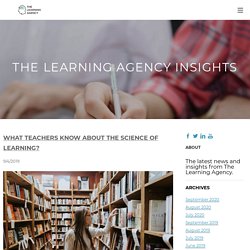
Executive Summary Ulrich BoserClarification: We wanted to clarify that all of the results cited in the report come from an analysis of the entire sample (which includes teachers and support staff), whether we use "educators" or "teachers" to reference the sample. Out of the 203 respondents, the sample includes three respondents who work in university-level education.
We have explored sub-group patterns, including only looking at the subset of respondents who report teaching in K-12. But response patterns don't differ significantly.Scientists know a lot about effective learning and teaching. Several lines of evidence suggest that teachers might have difficulty identifying some evidenced based practices and teaching strategies.
Top Findings. Science of Learning & Education. Printing on Post-its How-To, Plus Free Templates for Teachers. You know how when you teach, you have to write and rewrite notes 1,257 times?
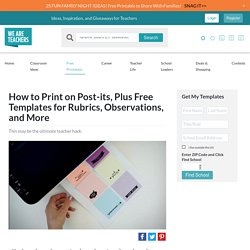
Your hand gets tired, and your writing starts to resemble someone who’s had too much wine (which you, for the record, have not). We have the greatest solution: printing on Post-its. We put together four teacher templates that we hope you steal, including observation notes, rubrics, and a writing checklist for your students. Get the full set of Post-it templates here. Take a look at our video to see just how easy it is. [embedyt] Use the blank template as your guide for printing. First, you’ll print the blank template. Try our observation notes as a quick way to track student progress. Buying and Gifting eBooks for Others.
The 10 Best Tech Tools for Student Assessment -WeAreTeachers. Assessment is at the heart of our teaching practice.
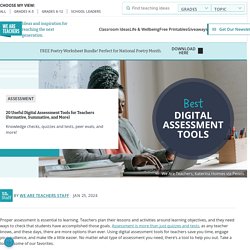
We use backward planning and start with the end in mind. Trauma-Informed Classroom: 7 Questions to Ask Your Students. When kids repeatedly act out in class, it’s disruptive and frustrating.
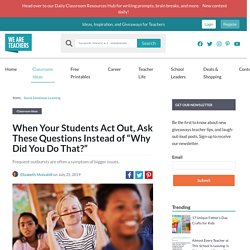
When we look beneath the surface, however, we often find that frequent outbursts are a symptom of bigger issues, especially for children who have experienced trauma. Usually, it’s a response to unmet needs or coping mechanisms children have developed to protect themselves. Kids living in chaos, neglect, or abuse are often stressed to the max.
And if there’s one thing that’s certain, it’s that stressed brains have difficulty learning . The good news is that teachers can have a positive impact by choosing our responses when disruptions happen. Here’s a video to give some ideas. [embedyt] Instead of saying, “This kid is trouble.” Ask yourself, “What’s going on with this child?” Obviously, this isn’t something most teachers would say out loud, but it may be part of an inner dialogue that needs to be challenged. Instead of assuming a child’s behavior is intentional or labeling their behavior, get curious. According to Dr. Resources for Talking To Students About the Attack on the Capitol. We’re all still reeling from the events in D.C. and trying to process our feelings about what happened.
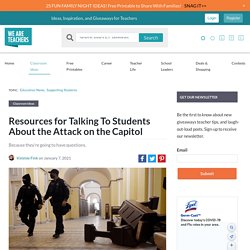
But as teachers, we’re also tasked with talking to the students in our care about the attack on the Capitol. If you’re feeling at a loss yourself, that might seem overwhelming. Here are some resources to help you address this topic with your class: Tips from Teachers Teachers in our Helpline group on Facebook came together to offer their colleagues advice on how to address students’ concerns about what happened. Create a safe space “I think setting the tone stating that you want to give a safe space for them to talk about how they feel without fear of any backlash or arguments, just an expression of their feelings.” Assessing learners online: assessment criteria. WebMath - Solve Your Math Problem. Welcome to Discovery Education's Puzzlemaker! Create crossword puzzles, word searches, mazes, and other puzzles for your classroom today!
Free Online Jigsaw Puzzles. Free printable bingo card generator. Generate and Print Bingo Cards with Bingo Baker. EJ1179956 - Teaching Strategies to Develop a Family-School Literacy Partnership, International Journal of Whole Schooling, 2018. This article explores a first-grade team's efforts to develop a family-school literacy partnership.
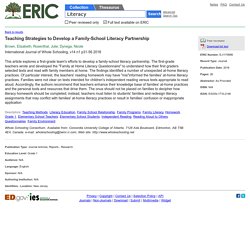
The first-grade teachers wrote and developed the "Family at Home Literacy Questionnaire" to understand how their first graders selected texts and read with family members at home. The findings identified a number of unexpected at-home literacy practices. Of particular interest, the teachers' reading homework may have "mis"informed the families' at-home literacy practices. Families were not clear on texts intended for children's independent reading versus texts appropriate to read aloud. Accordingly, the authors recommend that teachers enhance their knowledge base of families' at-home practices and the personal tools and resources that drive them. Whole Schooling Consortium. EJ1246114 - Cultivating Creativity in Adult Literacy Education Settings, Adult Literacy Education, 2019. EJ1034912 - Literacy in the Digital Age, Language and Literacy Spectrum, 2014.
21st century learners arrive at school with technological knowledge and skills that necessitate the need for educational systems to transform instructional practices to meet learners' needs.
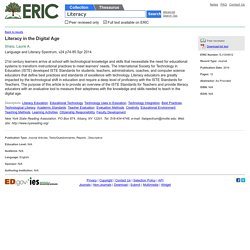
The International Society for Technology in Education (ISTE) developed ISTE Standards for students, teachers, administrators, coaches, and computer science educators that define best practices and standards of excellence with technology. Literacy educators are greatly impacted by the technological shift in education and require a deep level of proficiency with the ISTE Standards for Teachers. The purpose of this article is to provide an overview of the ISTE Standards for Teachers and provide literacy educators with an evaluative tool to measure their adeptness with the knowledge and skills needed to teach in the digital age. New York State Reading Association. EJ1243232 - New Approaches to Literacy Problems: Multiliteracies and Inclusive Pedagogies, Australian Journal of Teacher Education, 2019-Nov.
This paper is based on a qualitative study examining multiliteracies (New London Group, 1996, 2000) and inclusivity.
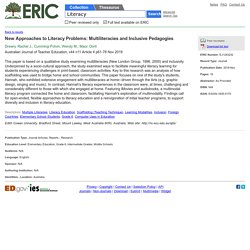
Underpinned by a socio-cultural approach, the study examined ways to facilitate meaningful literacy learning for students experiencing challenges in print-based, classroom activities. Key to this research was an analysis of how scaffolding was used to bridge home and school communities. This paper focuses on one of the study's students, Hannah, who exhibited extensive engagement with multiliteracies at home--driven through the Arts (e.g. graphic design, singing and music). - Meeting the Literacy Needs of Students in Juvenile Justice Facilities, Second Edition. Adolescent Literacy Guide, National Technical Assistance Center for the Education of Neglected or Delinquent Children and Youth (NDTAC), 2018-Sep.
Handout interactive assessment techniques. Continuing Education Webinars for Teachers. We Are Special: A Conversation About Special Education As general education teachers, we may be confused - or just curious - about the language of special educators, IEPs, SEL, ASD, 504s… as well as, their unique ability to connect, teach, and guide children with special needs.
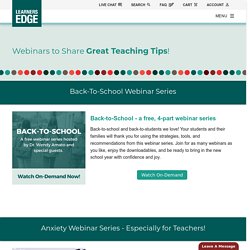
Join us for this 30 minute on-demand webinar “We Are Special: A Conversation About Special Education: Then, Now and Our Hopes For The Future,” as we talk with two special educators—currently part of the Learners Edge Curriculum & Instruction team.